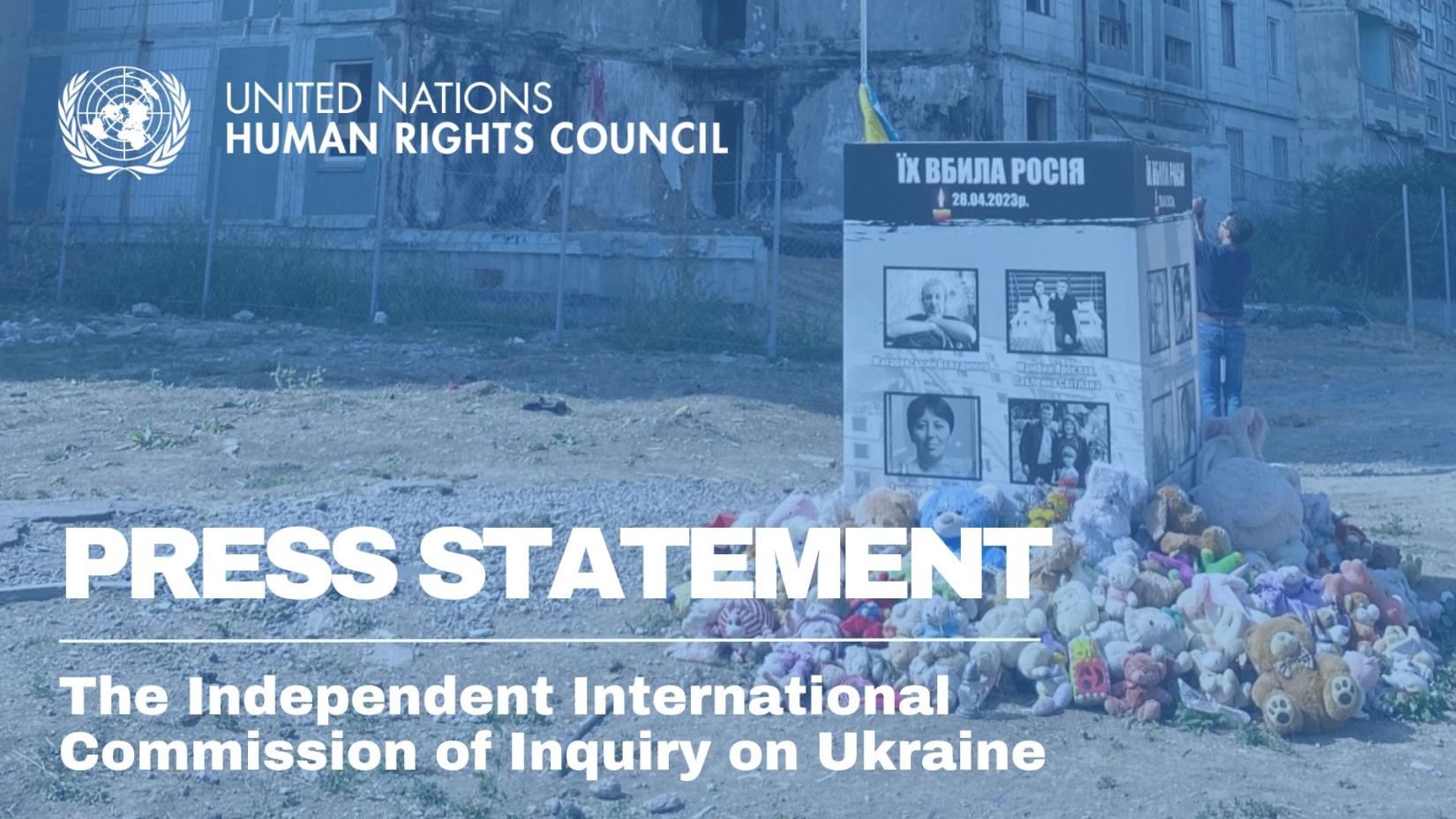Statement at the end of UN Commission of Inquiry on Ukraine’s visit to Kyiv
04 September 2023
Kyiv, Ukraine

Erik Møse, Chair of the Commission
On behalf of the United Nations Independent International Commission of Inquiry on Ukraine we want to welcome you to this press conference.
The Commission has now visited Ukraine more than ten times. This is the first time the three Commissioners are in the country during its second mandate from March 2023, whereas our investigators have already been here several times.
First, we visited Uman in the Cherkasy region and then travelled to Kyiv. We have met several interlocutors, including the Minister of Culture and Information Policy, the Ministry of Defence, the Ombudsman for Human Rights, the Office of the Prosecutor General, and the Security Service of Ukraine.
During the Commission’s first mandate, we provided two written reports: to the General Assembly in October 2022 and to the Human Rights Council in March this year.
Furthermore, last week we published an extensive Conference Room Paper. It is based on the March report and contains a detailed account of the basis for the findings of the Commission.
The Conference Room Paper presents a select number of cases and describes patterns of a wide range of violations by the Russian armed forces. The violations include wilful killings, unlawful confinement, torture, rape and other sexual violence, unlawful transfers and deportations of protected persons and children. Many of these violations qualify as war crimes, and some of them may, if confirmed by further evidence, amount to crimes against humanity, such as the use of torture and attacks on the civilian infrastructure.
The paper also contains extensive discussions of criminal and non-judicial accountability measures, as well as the need for coordination.
We take this opportunity to stress the importance for the Russian authorities to ensure that all perpetrators are held accountable. We also remind the Ukrainian authorities to complete investigations of the few cases where the Commission has found violations by the Ukrainian armed forces.
Vrinda Grover, Member of the Commission
In Uman, the Commission visited a residential multi-storey block of apartments hit during an attack in April 2023, where 24 persons, mostly women and children, were killed. We met with the residents, who shared their grief, personal loss and their ongoing difficulties in securing alternative housing. We also met with municipal authorities who are now responsible for providing assistance to the victims in terms of compensation for loss of family members, housing and other benefits.
The Commission recognises that the Ukrainian legal system faces immense challenges to provide accountability and justice to the victims of a range of conflict related crimes and violations, in the sphere of investigation, prosecution and adjudication.
Our meetings with NGOs also provided valuable insights into efforts by the state to respond to the formidable challenges relating to investigating and prosecuting conflict-related crimes, including sexual violence, as well as ensuring comprehensive redress to victim survivors.
Pablo de Greiff, Member of the Commission
The Commission has always argued that it would work on the basis of a wide notion of accountability, including judicial and non-judicial measures. It has therefore followed closely discussions about the establishment of reparations programs.
During the visit we had discussions with different stakeholders about the various initiatives emerging on this topic. The establishment of a comprehensive reparations programs is a long-term process, which should be distinguished from, but also coordinated with, national reconstruction programs, and property restitution and repair programs. A comprehensive program should also be designed in close consultation with the victims.
In the past we have insisted on the urgency of providing mental health and psychosocial support to the victims, and the Commission is gratified to find that there is greater awareness of the importance of doing so, although the actual delivery continues to be a challenge.
The Commission has also insisted on the importance of improved coordination between different services the government is already providing but in a disaggregated way, which imposes on victims some hurdles to access. We take the opportunity to reiterate these points.
The Commission will submit written reports of its activities to the General Assembly in October 2023, and to the UN Human Rights Council in March 2024.
ENDS
Background: The UN Independent International Commission of Inquiry on Ukraine is an independent body mandated by the UN Human Rights Council to, among other things, investigate all alleged violations and abuses of human rights and violations of international humanitarian law, and related crimes in the context of the aggression against Ukraine by the Russian Federation. Its aim is to establish the facts, circumstances and root causes of any such violations and abuses; and to collect, consolidate and analyse evidence of such violations and abuses, including their gender dimension, in view of any future legal proceedings.
Media contacts: Saule Mukhametrakhimova (traveling with the Commission), Commission of Inquiry Media Adviser, at saule.mukhametrakhimova@un.org / +43 676 3493464; In Geneva: Todd Pitman, Investigations Support Unit Media Adviser, todd.pitman@un.org / +41 76 691 1761, Pascal Sim, HRC Media Officer, simp@un.org / +41 79 477 4411.

